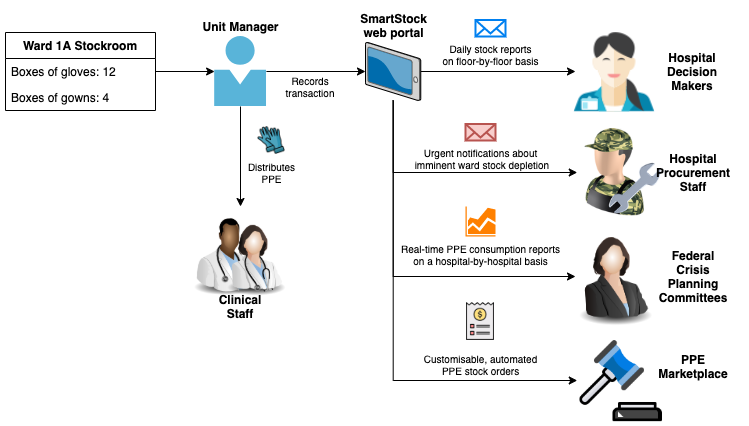The Rotational Nature of Junior Medical Jobs Inhibits Solutions to Workflow Problems
Coming and going all the time hurts our efficiency, and here's what we can do about.

At one point I had a conversation with one of my favourite coworkers, a consultant surgeon, that went a little something like this:
Him: "Josh, I thank you for all the hard work you do for us. But back in my day, we had to come in an hour or two before the ward round started to organise all the information for the day. It was a real struggle."
Me: "What do you think I do here every morning!?"
Him: "Oh I know, but back then we had a manual word document that we would maintain twice a day. At least today things have come a little bit further than that."
Me: "It really hasn't! That's exactly what we do."
It had been perhaps 15 years since they were in my position, but scarcely a thing had changed. And I don't know what was more concerning - that little had changed, or that the unit seemingly wasn't aware that this was the case¹.
It's moments like this that have taught me that there's many things that need to go well for change to happen in the health sector. So many in fact, that I want to try and summarise them all in a future discussion on this blog.
Today though, I'd like to focus on the observation that the rotational nature of junior medical jobs partially inhibits our capacity to solve workflow problems.
Always on the move
In Australia, a medical graduate typically undergoes 1 to 4 years of rotational medicine. Every 10 or so weeks, we move from specialty to specialty. This creates a cohort of doctors who get insight into a range of different approaches to medicine, as well as a taste for the diversity of modern medical practice.
It also functions as a bit of a try-before-you-buy scheme, both for junior doctors who might not know which specialty they want to apply to yet, and for specialist colleges who don't know which doctors they want to take on for training.
This is in stark contrast to the system in the US, where from day 1 as a doc, you're on a training program towards becoming a cardiologist, or a surgeon or a radiologist or so on.
So while this rotational approach likely creates more clinically well-rounded doctors², it's not without shortfalls.
A constant state of being "the new person in the office"
You know that feeling of being in a brand new job? Where you don't know exactly what you're doing, and that anything you touch will break? Junior doctors are constantly in that struggle.
Yes, there are lots of clinical things that carry over from specialty to specialty. And we all get very good at transitioning to new teams quite quickly. But different medical units run in different ways, and it's often the resident workflow approaches that vary the most.
For example, how are our days structured? Where do we get our information from? How does our team interact with others? What are the protocols that surround our specialty's key procedures or contributions to hospital function?
The junior doctors are the ones that sit on the coalface of these issues. When you're constantly in a "new job", it's hard to see where the workflows break down, or more importantly, the easy opportunities to improve them.
It might take 8 weeks of a 10 week term to see the edge cases where your current work tools really break down.
And given the glacial pace of change, even if you are able to see a solution to a workflow problem, it's highly unlikely that you'll be around to implement the fix over the following months. And as I've come to learn, it's really important to have someone of the ground to get these solutions across the line.
Although auxilary staff such as eHealth teams, senior clinicians, and medical support offices are generally supportive, it's very hard for them to appropriately address these problems when they aren't the ones facing them day-to-day. As I've said many times before on this blog, the person best placed to solve a complex problem is typically the person facing it every day.
And above all, I think the highly transient nature of the job can at times contribute to a nihilistic mindset about the drawbacks of a particular job. The doctor's mindset becomes "I just need to wait this job out" rather than "I just need to fix these 2 or 3 things in this workplace".
What can we do about this?
I don't suggest that I've got all the answers, but I've certainly go a few ideas about how we can start to change this.
#1 Tighter coupling between quality improvement and medical career progression
I'm aware of several colleges who value this highly, but I think until we see quality improvement as a really central part of medical practice (sitting close to or on-par with clinical reasoning, procedural skills, patient-centred communication and so forth), it will always play second fiddle. Let's incentivise the right things if we want to see the system change. (And perhaps we could drop "research for research's sake" from the agenda while we're at it too).
#2 Deliberate efforts to network clinicians with the technically minded
I'm of the opinion that email surveys are probably the weakest way to get genuine feedback about hospital systems. If we want our systems to change, we need to get doctors in the same room with the people who have the capacity to change them. I appreciate this is expensive, but so is a system that never evolves.
#3 Senior clinicians who empower and encourage junior doctors to take sensible risks in innovation
When I was first getting started trying to make noise in this sector, I had inadvertently got myself into a bit of hot water. I got a phonecall from the head of my department who basically said "Look Josh, I think the way you are going about this might need to change slightly, but keep doing what you're doing. If they try to take this any further, I'll go into bat for you.". Having the backing of a senior clinician directly contributed to me doubling-down, and led to great success. We should tap into this idea, and look for ways to systematically set up these partnerships.
#4 Continued investment in part-time clinicans who work on workflow projects
Perhaps this is a story for another day, but I really believe most people aren't built to be full-time clinicians. It's a demanding job in many respects, but especially in the compassion department. Many people I know would be far happier at somewhere on the 0.5 - 0.8 clinical FTE spectrum. A good place to put these extra days would be onto projects that drive efficiency and increase clinician satisfaction and output.
#5 Structured pathways for quality improvement projects
I've observed that often a person in the healthcare sector will have an idea for solution, but no clear pathway to take it forward. Who should have to approve this? How can we make it happen? Or are we just allowed to do x, y, z ourselves? Often, I see no clear answers to these questions, and that alone can be a huge deterrent to transformational success. Something like the NHS's Clinical Entrepreneur Programme springs to mind.
What do you think? Have you got more ideas to throw into the mix? Let me know.
¹ Not intended to be an attack on this doctor or the department, both of who have been vocal supporters of me and my attempts to innovate.
² Citation needed.
